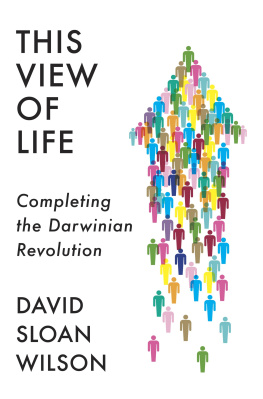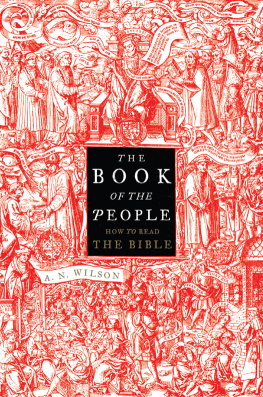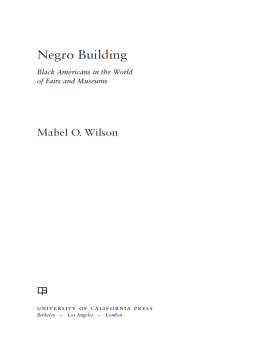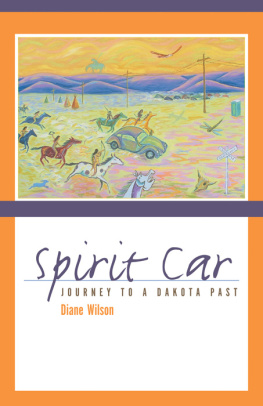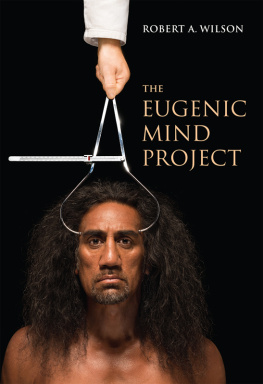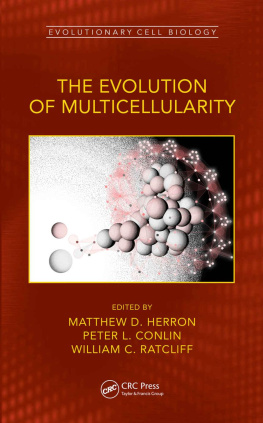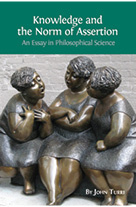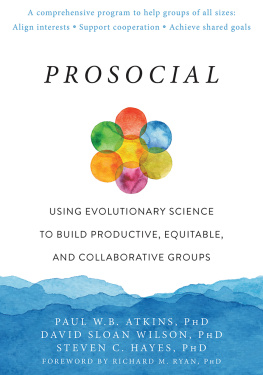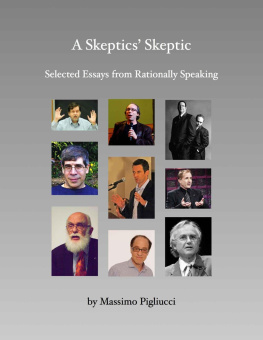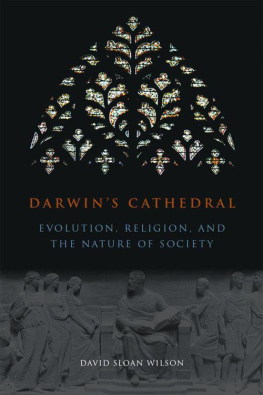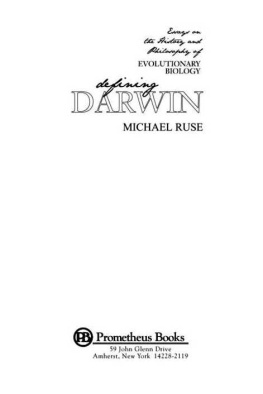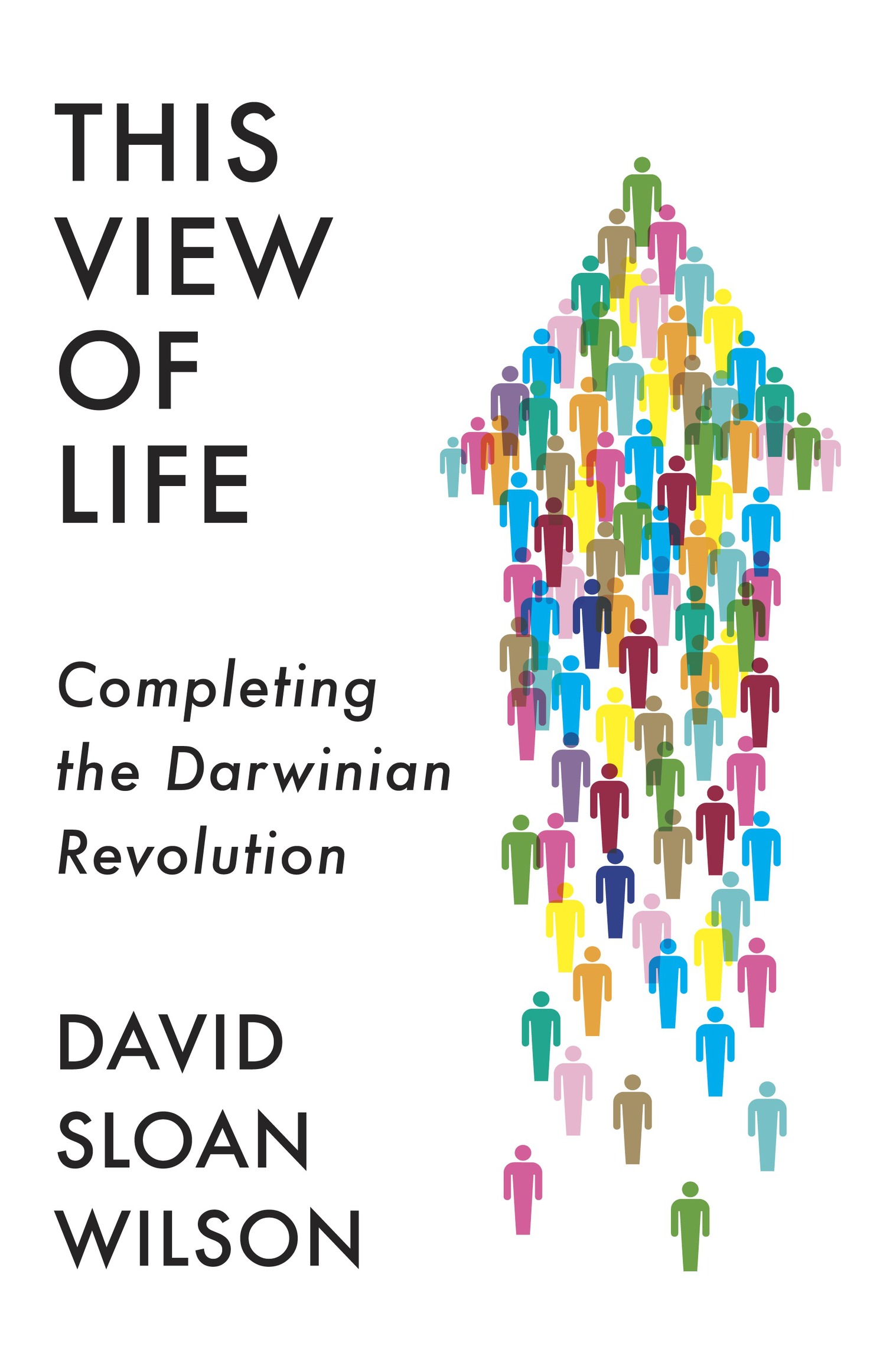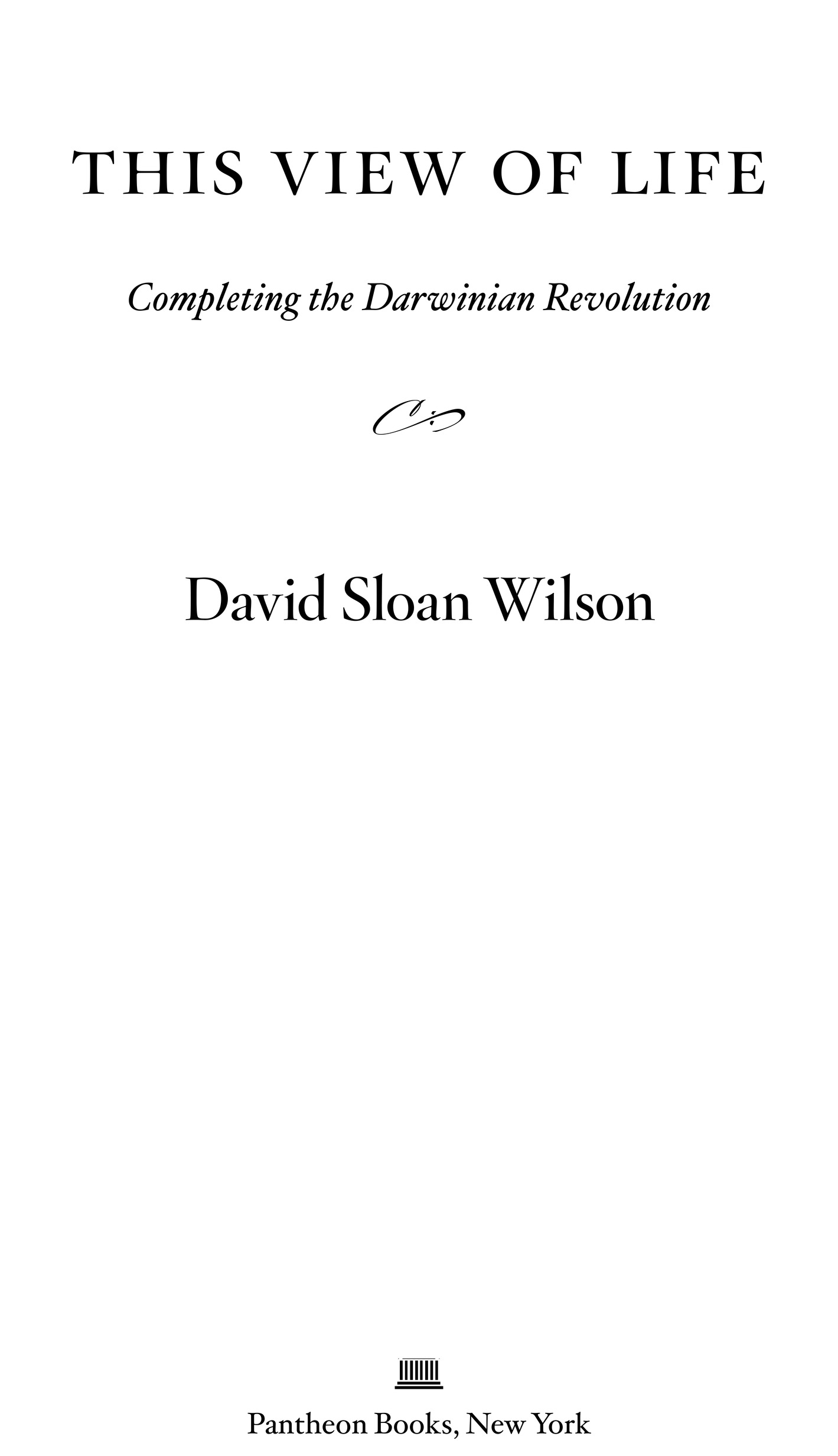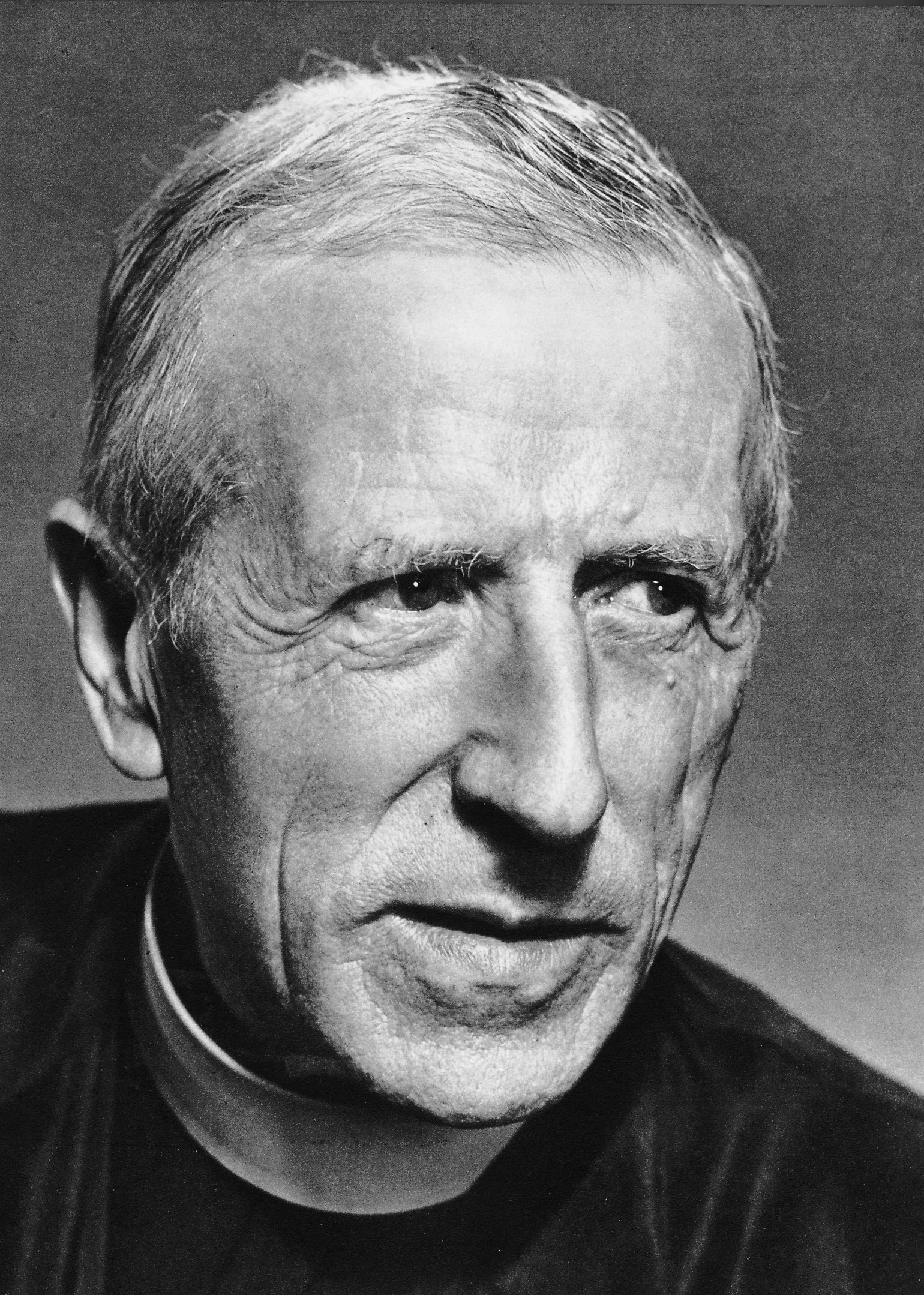A LSO BY D AVID S LOAN W ILSON
Does Altruism Exist? Culture, Genes, and the Welfare of Others
The Neighborhood Project: Using Evolution to Improve My City, One Block at a Time
Evolution for Everyone: How Darwins Theory Can Change the Way We Think About Our Lives
Copyright 2019 by David Sloan Wilson
All rights reserved. Published in the United States by Pantheon Books, a division of Penguin Random House LLC, New York, and distributed in Canada by Random House of Canada, a division of Penguin Random House Canada Limited, Toronto.
Pantheon Books and colophon are registered trademarks of Penguin Random House LLC.
Library of Congress Cataloging-in-Publication Data
Name: Wilson, David Sloan, author.
Title: This view of life : completing the Darwinian revolution / David Sloan Wilson.
Description: First edition. New York : Pantheon Books, 2019. Includes bibliographical references and index.
Identifiers: LCCN 2018031977. ISBN 9781101870204 (hardcover : alk. paper). ISBN 9781101870211 (ebook).
Subjects: LCSH : Social Darwinism. Social evolution.
Classification: LCC HM 631 . W 55 2019 | DDC 303.4dc23 | LC record available at lccn.loc.gov/2018031977
Ebook ISBN9781101870211
www.pantheonbooks.com
Cover design by Kelly Blair
v5.4
ep
To all who are reaching for an ethics for the whole world
There is grandeur in this view of life, with its several powers, having been originally breathed by the Creator into a few forms or into one; and that, whilst this planet has gone cycling on according to the fixed law of gravity, from so simple a beginning endless forms most beautiful and most wonderful have been, and are being, evolved.
C HARLES D ARWIN, O N THE O RIGIN OF S PECIES
The evil in the world comes almost always from ignorance, and goodwill can cause as much damage as ill-will if it is not enlightenedThere is no true goodness or fine love without the greatest possible degree of clear-sightedness.
A LBERT C AMUS, T HE P LAGUE
Contents
Prologue
Pierre Teilhard de Chardin (18811955), a scientist and Jesuit priest, made an observation about humankind that departed from both Christian doctrine and the scientific wisdom of his day: In some respects we are just another species, a member of the Great Ape family, but in other respects we are a new evolutionary process. That makes the origin of our species as significant, in its own way, as the origin of life.
Teilhard lived at a time when the Catholic Church still regarded science as a legitimate path to God. Like his predecessor, Galileo Galilei (15641642), he was both authorized to study the natural world and restricted when his inquiry began to threaten religious dogma. Whereas Galileo gazed at the heavens, Teilhard dug in the earth for fossils. He was a paleontologist and part of the team that discovered Peking Man (now classified as Homo erectus), one of the first fossil skulls that provided a missing link between us and our more apelike ancestors. Whereas Galileo was threatened with torture, Teilhard was blocked from accepting prestigious academic positions and forbidden to publish his work. His best-known book, The Phenomenon of Man, was written in the 1930s and Teilhard waited patiently until the end of his life before privately arranging for it to be published posthumously.
In this panoramic work, he describes earth before the origin of life as just another barren planet shaped by physical processes. Then, living organisms began to spread over its surface like a kind of skin. They too were just a physical process. Teilhard resisted the temptation to invoke a divine spark to explain the origin of life. But living organisms differ from non-living physical processes in their capacity to replicate and diversify into endless forms most beautiful, as Darwin wrote in the final passage of On the Origin of Species. Over immense periods of time, living processes began to rival non-living physical processes in shaping the planet and atmosphere, giving earth the unique appearance of a multicolored jewel when viewed from space. Using a word coined by the geologist Eduard Suess in 1875, Teilhard called the influence of life on the planet earth the biosphere.
Pierre Teilhard de Chardin: Scientist and Priest
Next, Teilhard asks us to imagine one species, located on one twig of the tree of life, that begins to proliferate and diversify much more rapidly than the other twigs. In an astonishingly short period of time, a new skin spreads over the earth, rivaling other living processes and non-living physical processes in shaping the planet and atmosphere. That species was Homosapiens, and Teilhard coined a new word, the noosphere, to describe the second skin.
This word is derived from the Greek word for mind (nous), signifying that the new skin has a mental dimension in addition to a physical dimension. Teilhard described consciousness as a process of evolution reflecting upon itself. He portrayed the human colonization of the planet as starting with tiny grains of thought that would eventually merge with each other to form a global consciousness and self-regulating superorganism called the Omega Point.
The idea that we are part of something larger than ourselves, which could be considered an organism in its own right, has been expressed a thousand different ways in cultures around the world. So too has the idea that the something is expandingor at least needs toultimately embracing all of humankind and the planet earth. Sometimes these ideas are given a religious and spiritual formulation, but they also lie behind practical efforts to create good governments and economies and to expand their scales. From a purely secular perspective, Teilhards Omega Point corresponds to the vision of a world where governments work together for the good of their citizens and live in balance with the rest of life on earth. We seldom associate politics and economics with religion and spirituality, and in many ways we feel the need to keep them apart, as with the separation of church and state. Nevertheless, words such as corporation (derived from the Latin for body) and phrases such as body politic signify that whatever we mean by the word organism can be applied to entities that are larger than organisms, such as a human society or a biological ecosystem.
Teilhards cosmology was new, compared to his Christian faith and all other previous cosmologies, because it was based on Darwins theory of evolution. As a scientist, he could claim the authority of the best factual knowledge of his day. As a priest, his writing had an inspirational quality that went beyond a purely scientific treatise. Alone, science only tells us what is and not what ought to be. To get from is to ought, we must combine facts with values. It is a fact that torture causes pain, but we need the value that causing pain is wrong before we can conclude that we ought not to torture. Teilhard described the Omega Point as not just a theoretical possibility but a sort of heaven on earth worth pursuing with ones heart and soul.

